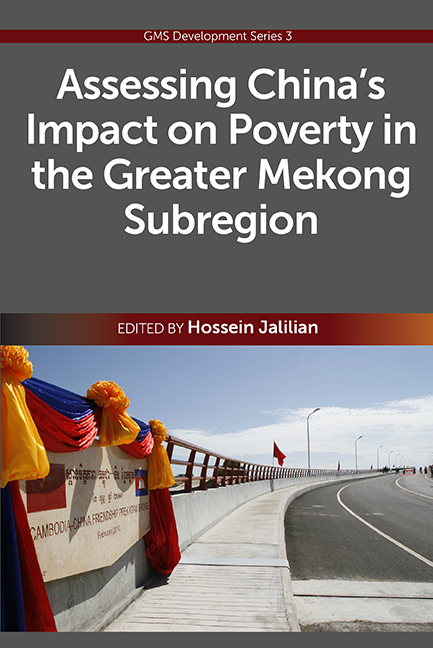Book contents
- Frontmatter
- Contents
- List of Figures, Tables and Boxes
- Foreword
- List of Contributors
- PART I The Context
- PART II CHINA AND THE GMS-4
- PART III THE GMS-4 AND CHINA
- 5 Impacts of China on Poverty Reduction in Vietnam
- 6 Impacts of China on Poverty Reduction in Thailand
- 7 Impacts of China on Poverty Reduction in Cambodia
- 8 Impacts of China on Poverty Reduction in Laos
- Index
6 - Impacts of China on Poverty Reduction in Thailand
from PART III - THE GMS-4 AND CHINA
Published online by Cambridge University Press: 21 October 2015
- Frontmatter
- Contents
- List of Figures, Tables and Boxes
- Foreword
- List of Contributors
- PART I The Context
- PART II CHINA AND THE GMS-4
- PART III THE GMS-4 AND CHINA
- 5 Impacts of China on Poverty Reduction in Vietnam
- 6 Impacts of China on Poverty Reduction in Thailand
- 7 Impacts of China on Poverty Reduction in Cambodia
- 8 Impacts of China on Poverty Reduction in Laos
- Index
Summary
INTRODUCTION
Over the last three decades, China has witnessed dramatic economic transformation, rapid development and greater involvement in regional and global economic and political affairs. Because of the huge size of its economy, China's development is likely to have great impacts on other countries, both positive and negative. For example, its economic and political expansion may squeeze some small, poorer countries out of the world economy, while perhaps pulling others up — the effects may vary according to context-specific factors. Regionally, it can be said that the current increasing economic interdependency implies that China will likely have profound social, political and economic impacts on countries in ASEAN, GMS and Thailand in particular.
Overview
Thai-Chinese Economic Interactions
Thailand and China have a long-standing close relationship. Diplomatic relations between the two countries have been officially established since 1 July 1975. Economic cooperation began in 1978 when China opened its doors to the market economy. Trade between the two countries has increased from approximately US$25 million in 1978 to approximately US$31,062 million in 2007. In terms of investment, Thailand'S investors started to invest in China as early as 1979 (THAI BIZChina.com). More recently, a Thailand-China Free Trade Area (TCFTA) was implemented in October 2003, under an early-harvest programme (EHP) that covered fruits and vegetables. The TCFTA follows an agreement on comprehensive economic cooperation called ASEAN-China Free Trade Area (ACFTA) signed by the leaders of ASEAN and China in Phnom Penh on 4 November 2002. The agreement with ASEAN-6 members (Thailand, Singapore, Malaysia, Indonesia, Philippines and Brunei) and China became effective in 2010 and will include new ASEAN members and China by 2015. In addition, an ASEAN-China Agreement on Trade in Services of the Framework Agreement on the Comprehensive Economic Cooperation was signed on 14 July 2007 in Cebu, the Philippines, and an ASEAN-China Investment Agreement of the Framework Agreement on the Comprehensive Economic Cooperation was reached on 9 November 2008.
- Type
- Chapter
- Information
- Publisher: ISEAS–Yusof Ishak InstitutePrint publication year: 2013



